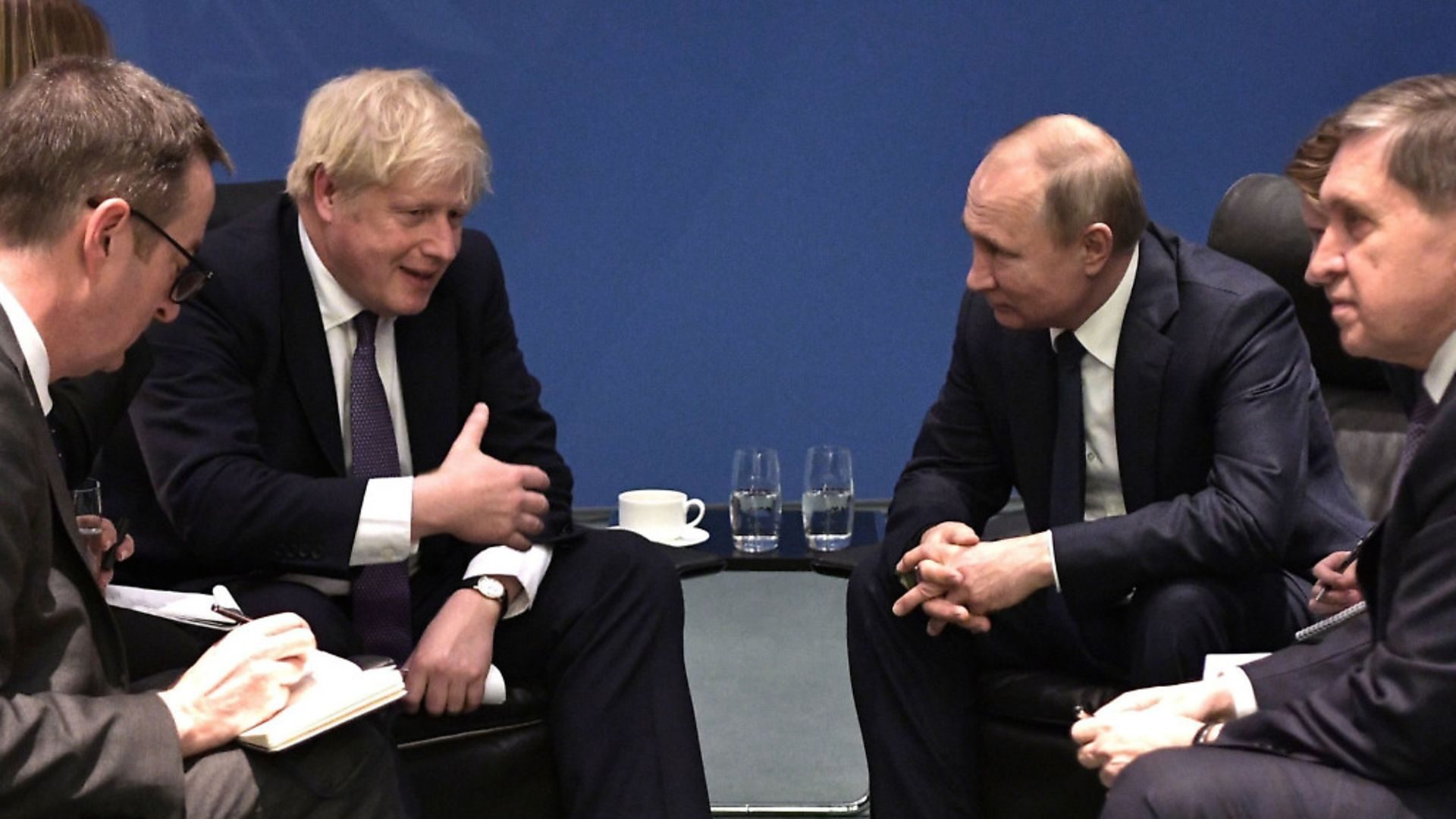It was a classic piece of Boris Johnson boosterism: his claim in the House of Commons that Britain was “helping to bring the West together” in the face of Russian threats to Ukraine. As with so many of the prime minister’s recent utterances, however, the facts might beg to differ.
Johnson did indeed speak to Vladimir Putin on Wednesday afternoon – after initially delaying the phone call so that he could deal with the fallout from civil servant Sue Gray’s report into rule-breaking parties at Downing Street – but he can have been under no illusion about the effect of his intervention with the Russian leader.
Before the call, Kremlin spokesman Dmitry Peskov said Putin was open to talking to everyone. “Even to someone who is utterly confused, he is prepared to provide exhaustive explanations,” Peskov said.
Typical Russian political trash-talk, one might think, and perhaps aimed more broadly to signal the country’s defiance in the face of Western calls for it to step back from the brink and de-escalate the crisis.
But Foreign Secretary Liz Truss rather proved Peskov’s point when she that Britain was “supplying and offering extra support to our Baltic allies across the Black Sea.” A welcome sentiment, no doubt, but the Baltic Sea and the Black Sea are at opposite ends of Europe.
Russia’s foreign ministry spokeswoman Maria Zakharova was not impressed.
“Ms Truss, your knowledge of history is nothing compared to your knowledge of geography. If anyone needs saving from anything, it’s the world, from the stupidity and ignorance of British politicians.”
A brutal put-down but one could perhaps argue Truss’ error was a one-off, an unfortunate slip or, as the Foreign Office said, a misinterpretation of her remarks. However, there was more to come from Russia’s Deputy UN Ambassador Dmitry Polyanskiy and this was even more worrying.
“There is always room for diplomacy, but frankly, we don’t trust British diplomacy. I think in recent years British diplomacy has shown that it is absolutely worthless,” he told Sky News.
One might argue that the Russians would say that, wouldn’t they? But distrust of this British government extends further and can, in part, be traced back to a perception that the government of post-Brexit Britain cannot always be trusted to do what it says it will do. Or to have the right motives for its actions.
There was another glaring example of this on Thursday as the endless row over the Northern Ireland protocol sparked into life again. The slow-burn of this issue has, perhaps, done more than anything else to weaken European trust in Britain because, after all, Boris Johnson and his government have been trying to wriggle out of this agreement since they signed it in 2019.
The protocol was meant to ensure the absence of a hard border on the island of Ireland by essentially keeping the province in the EU’s customs union for goods and creating a border in the Irish Sea. The idea is to protect the Good Friday agreement that brought an end to around three decades of bloodshed that claimed more than 3,000 lives.
On Wednesday, Northern Ireland’s Agriculture Minister Edwin Poots ordered an immediate halt to checks at ports on agri-foods coming into the region from the UK, in violation of the protocol and the commitments made by the British government.
Brandon Lewis, the secretary of state for Northern Ireland, suggested the UK government would not intervene as this was a matter for the Northern Irish executive and within their legal remit.
Irish Foreign Minister Simon Coveney was not having it.
“Put simply, the British Government has an obligation to comply with international law. Surely that’s not too much to ask as we all work to find agreement on flexible and pragmatic implementation of the NI Protocol,” he tweeted.
Upping the ante a few hours later on Thursday, Northern Ireland’s First Minister Paul Givan resigned in protest at the checks on goods crossing the Irish Sea. Givan and Poots are members of the Democratic Unionist Party (DUP), which says the protocol creates economic hardship and undermines the province’s position as an integral part of the UK.
Truss was due to speak to Maroš Šefčovič, the EU commissioner dealing with the protocol, later on Thursday for further talks on resolving the long-standing row but Poots’ action and Whitehall’s reaction will have done little to shore up European trust.
Simon Hoare, the Conservative MP and chair of the Northern Ireland select committee, tweeted: “In relation to NI Protocol checks: I’m a Conservative. I believe in the rule of law and adhering to obligations we voluntarily entered. There’s no ifs and buts on this. The reputation of the UK on these matters is important. Anyone who cares about the UK should feel the same.”
Apart from embarrassing gaffes on the world stage and the often cynical brinkmanship over Northern Ireland, there can be little doubt that the political row over lockdown parties in Downing Street is also chipping away at Britain’s image abroad.
Johnson and his team want the country to move on from #Partygate. They want to “get on with the job” of governing but it turns out that the most consequential result of the superficially trivial scandal may not be the damage done to the prime minister’s reputation but the perception at home and abroad that this is an administration that cannot be trusted in what it says. Or why it says it.
As Johnson’s hero Winston Churchill noted: “It is also a great error if you ever give the impression abroad that you are using language which is more concerned with your domestic politics than with the actual fortunes and merits of the various great countries upon the Continent to whom you offer advice.”












